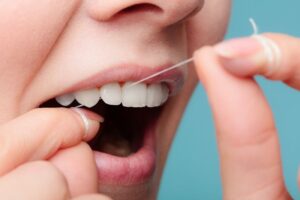You likely understand that flossing is a crucial step in your oral hygiene routine. But what makes flossing and oral hygiene so important to maintaining a healthy smile? Cleaning your smile with regular teeth brushing and flossing will reduce your risk for serious dental problems like cavities.
A cavity is an early form of tooth decay that can wreak serious havoc on your dental structure. A dentist can treat a cavity with a dental filling. But you should preserve your natural smile for as long as you can.
Preventative dental efforts like your oral hygiene regimen, specifically flossing, must be completed thoroughly and consistently to maximize the protective benefits. Read on to learn more about the importance of flossing regularly to avoid forming cavities.

What Causes Cavities?
A cavity is a type of tooth decay that develops in the enamel, the outer layer of your tooth. It occurs when the natural bacteria in your mouth access weak spots in the enamel and start to eat away at your dental structure, creating a hole in the tooth’s surface.
A dentist fixes this problem by drilling away the decayed part of the tooth and filling the hole with resin. The dental filling seals the vulnerable area of the tooth, protecting it from further harm, while also restoring its structure.
Though a dentist can treat most cases of decay within one easy appointment, you should preserve your smile by avoiding forming cavities in the first place. Practicing good oral hygiene should be one of the measures you take to protect your dental health.
How Does Flossing Prevent Cavity Formation?
You practice oral hygiene – flossing daily and brushing your teeth at least twice per day – to remove plaque and other harmful particles from your smile. Natural oral bacteria create a film of plaque over your teeth which will require removal or else it will start to hurt your dental structure.
Brushing your teeth will reach most of the surface area of your teeth to clear away plaque. But flossing is necessary to access and clean the spaces between your teeth. You use waxed string inserted between teeth to rub carefully against the sides of the teeth where a toothbrush cannot reach.
If you skip flossing, you could form interproximal cavities, or a type of decay forming between two teeth. A dentist can treat these cavities. But they may need to remove more enamel to reach and remove the decay fully. So ideally, you need to pay extra attention to these spots of your smile so that you do not develop these cavities.
A dentist can scrape away plaque and tartar build-up between teeth during a dental cleaning. But you need to address these residues and their removal daily with flossing to avoid irreversible harm to your teeth.
Learn more about preventative dental care and optimal oral hygiene practices when you call your dentist. Schedule an oral exam and teeth cleaning in Media, PA today by calling 610.756.0649.

